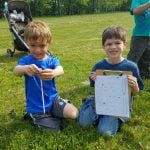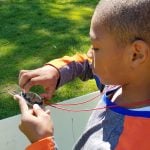Our Spring field trip offerings are listed below. The accompanying lessons plans are a sample of the lessons present and the content of each field trip might vary slightly based on the instructor presenting and individual class needs. To customize a lesson or additional content not listed please contact the CSEO Director


Field trips are available to schools in the CCISD and GOISD school districts.
Cost: The field trips are $50 per class (up to 30 students). The CSEO will invoice each school at the end of
the season for the total number of field trips provided for each school during that season.
Program Descriptions
Please click on the activity title for a sample lesson plan. These plans are a rough idea of what teachers can expect from a lesson. Content can be customized according to class needs or Teacher/Instructor discretion
GRADE K
Signs of Spring (½ – 1 hr)
Students will make observations of signs of spring and consider how the environment is changing. Can we find young plants pushing up through dead leaves or pavement? How about insects in holes in trees or under logs? Students will consider how color helps animals to survive.
Standards addressed: K-LS1-1, K-ESS2-2, K-PS3-1
GRADE 1
Animal Life Cycles (½ – 1 hr)
What is metamorphosis? Students will explore the life cycles of familiar wildlife and understand that living things grow and change. They will go on a hunt to find small insects (moths, butterflies, caterpillars, ants, and black flies) to determine if they are adults or not. [Option to extend and use insect nets, bug boxes.]
Standards addressed: 1-LS3-1
GRADE 2
Gr.2 Frog-tastic (1 – 1½ hr)
Students will participate in a variety of activities followed by a search for frogs. Students will describe the basic requirements, adaptations, and life cycle of frogs.
Standards addressed: 2-LS4-1
Who Lives in a Tree? (½ – 1 hr)
Trees provide food and shelter to many animals. Students will develop an awareness of trees and some of the animals that live in them and make connections as to how plants help animals and animals help plants by pollination or by distributing seeds.
Standards addressed: 2-LS2-2, 2-LS4-1, K-2-ETS1-3
GRADE 3
What’s For Dinner? (1 – 1½ hrs)
Students will learn about predator/prey relationships and strategies animals have developed to avoid being eaten. They will discover that some animals of the same species are better at surviving because they have slightly different characteristics that help them. They will define producers and consumers as they examine food chains and food webs.
Standards addressed: 3-LS2-1, 3-LS4-3, 3-LS4-2
GRADE 4
Wetland Ecology (1 – 1½ hrs)
Students will investigate wetlands by studying the soil, plants, and hydrology. Students will be able to describe the essential components of a wetland and classify them. They will also learn why wetlands are such important ecosystems.
Standards addressed: 4-ESS3-1, 4-LS1-1
GRADE 5
Soil Science (1 – 1½ hrs)
What is soil? How can soil be described according to texture? Does water move through different soil types faster? What kinds of organisms live in soil? Students will conduct an investigation to describe various soil types and compare percolation rates. Standards addressed: 5-PS1-3, 5-ESS2-1
Birds in Spring 1½ hrs
Spring is a busy time for birds. They are returning from migration, mating and building nests. Students will listen and look for birds and record the data, practice using binoculars and learn the names of some common birds.
Leave No Trace (1 hr)
With increased human populations increased participation in outdoor recreation activities many areas where people popular natural areas are becoming crowded, polluted, and damaged. Students will learn how responsible actions can help protect the outdoors and how they can become capable and well-informed stewards of natural spaces.
GRADE 6-8
Birds in Spring (1.5 hrs)
Spring is a busy time for birds. They are returning from migration, looking for a mate, and building
nests. Students will listen and look for birds and record the data, practice using binoculars and learn
the names and songs of some common birds.
Pond Biodiversity, Food Webs, and Ecology 1½ hrs
Students collect data to discover fauna, and flora of a pond. Students will sample pH, dissolved oxygen, and temperature. We will discuss ways to make sure we are not negatively impacting the delicate ecosystem of a pond.
Standards addressed: MS-LS2-1
Assess the Health of a Stream (1-1.5 hrs)
Collect macroinvertebrate bioindicators (sensitive, mid-tolerant, or tolerant) of water quality pH,
dissolved oxygen, turbidity and temperature to assess the health of a stream.
Standards addressed: MS-LS2-1
Leave No Trace (1 hr)
With increased human populations increased participation in outdoor recreation activities many
areas where people popular natural areas are becoming crowded, polluted, and damaged. Students
will learn how responsible actions can help protect the outdoors and how they can become capable
and well-informed stewards of natural spaces.
_________________________________________________________________________________________________________________
Important information __________________________________________________________________________________________________________________________________________________
Appropriate Dress:
The weather can be very unpredictable at this time of the year. Please have your students dress for the weather conditions! We recommend boots for wet, muddy conditions. Some rubber boots will be available for field trips to a wetland or pond.
Locations for Spring Field Trips:
- Michigan Tech Recreational Trails
- Maasto Hiito Trails
- Lake Linden-Hubbell School Forest
- McClain State Park
- Calumet Waterworks Park
- Calumet Lake/ Calumet Lions Park
- Black Creek Nature Sanctuary
- Baraga School Forest
- Ford Center and Forest (Alberta)
- Bessemer City Park
- Norrie Park
- Ottawa National Forest Visitor Center
- Lake Perrault
- Your school
Cancellation Policy: the Center will not cancel any field trips due to weather, it is the responsibility of the teacher to
decide if a field trip should be cancelled. To cancel a field trip, please call the CSEO Director at (906)
487-2412 at least 2 hours in advance (3 hours for Gogebic/Ontonagon schools).
For more information, contact:
Tom Oliver, CSEO Director
Email: teoliver@mtu.edu
Phone: 906-487-2412 (office)
Field Trip Financial Support
The Outdoor Science Investigation Field Trip Program has been funded since 2008 with a grant from the Wege Foundation to Michigan Tech.
In 2012 and 2015, snowshoes were purchased with support from the Keweenaw Community Foundation and the MEEMIC Foundation,
respectively. In 2016, another grant from the Keweenaw Community Foundation is funding technology to support outdoor investigations.
The field trip program is coordinated by the Michigan Tech’s Center for Science and Environmental Outreach and the Western UP Center for Science, Math and Environmental Education. It is funded in part by the Michigan STEM Partnership and the Wege Foundation.
